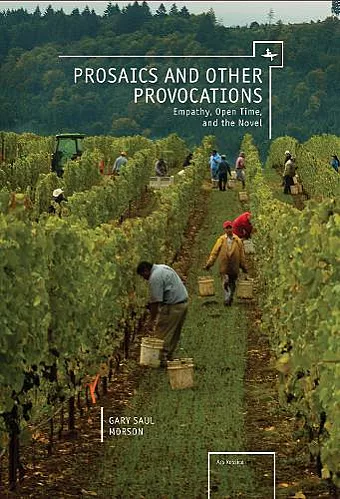Prosaics and Other Provocations
Empathy, Open Time, and the Novel
Format:Hardback
Publisher:Academic Studies Press
Published:30th Aug '13
Currently unavailable, and unfortunately no date known when it will be back

Gary Saul Morson’s ideas about life and literature have long inspired, annoyed, and provoked specialists and general readers. His work on “prosaics” (his coinage) argues that life’s defining events are not grand but ordinary, and that the world’s fundamental state is mess. Viewing time as a “field of possibilities,” he maintains that contingency and freedom are real. To represent open time, some masterpieces have developed an alternative to structure and require a “prosaics of process.” Morson’s curmudgeonly alter ego, Alicia Chudo, invents the discipline of “misanthropology,” which explores human vices from voyeurism to violence. Reflecting on his legendarily popular courses, Morson argues that what literature teaches better than anything else is empathy. Himself an aphorist, Morson offers a witty approach to literature’s shortest genres and to quotation in general.
“Morson epitomizes the elusive scholar/teacher, equally comfortable theorizing about literature (particularly the novel) and teaching us how to teach in a way that captivates and fascinates students of all levels. His trademark wit is everywhere in evidence in this delightful and wide-ranging collection that shows he belongs to the ranks of the greatest scholars and readers of literature, on a level with Frank Kermode and Wayne Booth.” -- Andrew Wachtel, President, American University of Central Asia, Bishkek, Kyrgyzstan
“Morson’s provocations elevate sheer common sense to the level of non-absolutist metaphysics. His learning and wit would be a pleasure to encounter at any time, but they are particularly welcome—indeed, needed—amidst the glum earnestness and hand-wringing now rife in the academic humanities. ‘Prosaics,’ as it has evolved since Morson’s early work on Tolstoy and Bakhtin, emerges as a pragmatic worldview. Here is a vision of the novel (and its potential consequences) capacious as the genre itself. Wise, funny, and beautifully written, this is a fine contribution to ethics and pedagogy, as well as the study of literature.” -- Michael Holquist, Professor Emeritus of Comparative Literature, Yale University
“Gary Saul Morson’s work discusses literature splendidly, but also goes beyond it to present a new, compelling vision of the human world. Our lives, Morson tells us, do not follow abstract, definite laws, be they historical or economic. We interact with other human beings without always fully knowing what situation we or they are in, we improvise, we invent, we thrive among details rather than grand pictures, we need concrete truths rather than poetic ones, and this is why realist novels, in particular the Russian ones, are so revealing. Morson’s book provides an extraordinary introduction to the prosaics of life.” -- Thomas Pavel, Gordon J. Laing Distinguished Service Professor, University of Chicago
"Morson, in a tremendous collection of pieces, extends his ongoing interest in what he calls 'prosaics'—basically, a way of attending to fictional prose that makes room for the messiness, the loose ends, and the improvised form that one finds in the great realist writers (for Morson, especially Dostoyevsky)." -- James Wood * "Favorite Books of 2013," The New Yorker *
“Read this book. While it is inspired by (and offers brief but illuminating studies of) the masterworks of Tolstoy and Dostoevsky, the volume’s relevance greatly transcends Russian literature, indeed it offers a corrective to much (one is tempted to say all) thought, whether that includes technological or economic history, animal or language speciation, or deconstructing the Old Testament. . . . Readers who cherish various theories of literature or even science itself will find Morson a contentious, amusing, and always-eloquent conversationalist, who argues for a “counter-tradition,” a life affirming perspective that opposes all-encompassing laws and patterns with details, processes, and especially our consciousness of the present moment with all its innumerable potentials.” -- Brett Cooke, Texas A&M University * The Russian Review, January 2015 (Vol. 74, No. 1) *
“Professors in undergraduate and especially graduate courses offered, and perhaps still offer, dire warnings against treating literary characters as though they somehow resembled real people or focusing on the writer’s intent in producing a work. Evaluation—declaring a work to be “good” or “bad”—was to be abjured. Morson cheerfully, even aggressively, violates these prohibitions. He is not afraid to single out those writers and works that he calls great, to consider the views of authors on literature, and to use novels as a means for probing ethical issues that individuals may face in real life.” -- Barry P. Scherr (Dartmouth College) * Slavic and East European Journal, 58.3 (Fall 2014) *
ISBN: 9781618111616
Dimensions: unknown
Weight: unknown
300 pages